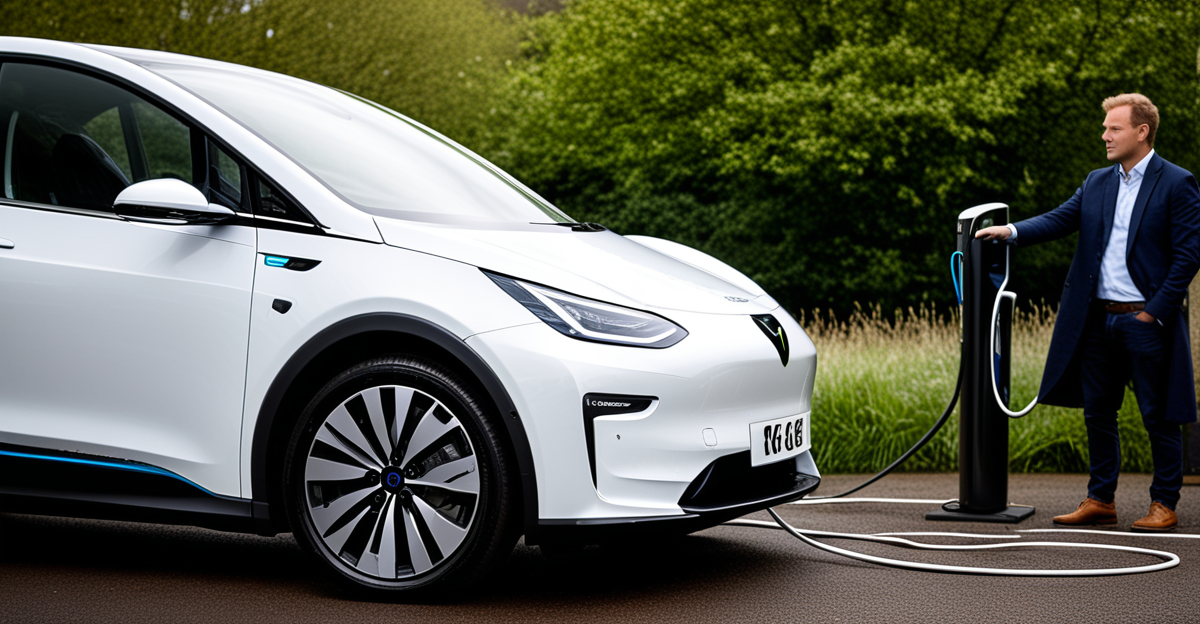Key Regulatory and Policy Drivers for Electric Vehicle Growth
Government policy in the UK is a critical driver for the accelerating adoption of electric vehicles (EVs). The UK government has implemented comprehensive EV regulation aimed at meeting ambitious net zero targets, which mandate the phasing out of petrol and diesel cars by 2030. These electric car mandates set clear deadlines for zero-emission vehicle requirements, compelling manufacturers and consumers alike to adapt.
The UK’s policy framework includes stringent emissions laws, which enforce reductions in vehicle tailpipe pollution. These regulations serve as a decisive catalyst for the shift from internal combustion engines to fully electric powertrains. In tandem, government incentives play a pivotal role: the availability of grants and tax benefits significantly lowers the upfront cost and total cost of ownership of EVs, making them more accessible to a broader population.
Topic to read : What Are the Future Technological Innovations Shaping the UK Automotive Industry?
The phased timeline implies that starting well before 2030, there are incremental restrictions on sales of new petrol and diesel vehicles, encouraging early adoption of EVs. Subsidies on EV purchases and investments in charging infrastructure further reinforce this trend. The combined impact of these policies ensures a robust push toward electrification, aligning the automotive market with the UK’s net zero targets and sustainability ambitions.
Overall, the government EV policy landscape not only shapes market behavior but also drives innovation among manufacturers, resulting in a rapid expansion of the UK electric car market. This coordinated approach ensures steady progress toward a cleaner, greener transport sector.
In parallel : How is the UK automotive industry supporting sustainable supply chains?
Advances in Battery Technology and Vehicle Range
Recent strides in battery innovation have significantly enhanced EV range improvements, addressing one of the key concerns for potential electric vehicle buyers. Advances in lithium-ion chemistry, solid-state batteries, and energy density optimization have enabled vehicles to travel longer distances on a single charge, often surpassing 200 miles in typical daily use. These improvements directly bolster consumer confidence, helping to reduce “range anxiety” and allowing EVs to compete more favorably with petrol and diesel vehicles.
In the UK, investments in research and development are driving UK electric car technology forward. Several UK institutions and manufacturers are pioneering battery enhancements that not only increase capacity but also improve charging speed and battery longevity. These innovations contribute to more sustainable battery production and recycling initiatives, aligning battery technology development with the country’s green objectives.
Moreover, better battery performance lowers the overall cost of ownership, as batteries become more affordable and durable. This trend, combined with enhanced vehicle range, encourages broader adoption of electric vehicles, supporting the UK’s trajectory toward a cleaner transportation sector. As battery technology continues to evolve, it remains a fundamental enabler of the UK’s EV growth and a critical factor in achieving net zero transport goals.
Charging Infrastructure Expansion and Accessibility
The expansion of EV charging stations UK is fundamental to accelerating electric vehicle adoption. The current public charging network has grown rapidly, incorporating thousands of publicly accessible chargers across urban and suburban areas. This expansion addresses one of the main practical barriers consumers face: reliable access to charging beyond their homes. The development includes an increasing number of workplace chargers and dedicated home installation support, providing a comprehensive solution to different user charging needs.
Regional disparities remain a challenge, with rural and remote areas having fewer charging points compared to cities. This gap can deter potential UK EV buyers in those locations due to concerns about accessibility. To combat this, government initiatives and private partnerships target infrastructure deployment in underserved regions to ensure equitable access nationwide. Such projects often involve collaborations with local authorities, energy providers, and private firms to optimize placement and maintenance of charging stations.
The rise of rapid charging infrastructure is particularly transformative. Rapid and ultra-rapid chargers reduce EV charging times dramatically, which is critical for long-distance travel and increasing convenience for drivers. Their integration into the public network and popular travel corridors helps mitigate “range anxiety” further, making electric cars a practical option for more UK motorists. Additionally, technological advances in charger compatibility and payment systems contribute to a smoother user experience, encouraging broader use of public charging points.
Overall, the growth and diversification of the EV charging ecosystem are essential components of the UK’s journey toward widespread EV adoption. Expanding this network not only supports current electric car owners but also lays necessary groundwork for meeting the UK net zero targets by facilitating a seamless transition to electric transportation.
Automotive Industry Investments and Supply Chain Development
The growth of UK EV manufacturing reflects significant automotive investment aimed at meeting increasing demand and fostering innovation. Several major UK-based and international automotive companies are channeling substantial funds into developing next-generation electric vehicles. These investments encompass expanding production facilities, adopting advanced manufacturing technologies, and enhancing R&D capabilities dedicated to electric powertrains and vehicle software.
A critical element supporting this expansion is the emergence of battery supply chain infrastructure within the UK. The establishment of battery gigafactories is pivotal, as they enable localized, large-scale production of battery cells, reducing dependence on imported components. This localized supply chain not only improves cost efficiencies but also strengthens the resilience of the UK’s EV manufacturing ecosystem amidst global disruptions.
Furthermore, collaboration across the automotive sector is intensifying. Automakers, technology firms, and energy providers are working in synergy to optimize vehicle design, battery technology, and charging solutions. These partnerships accelerate innovation cycles and ensure that the UK remains competitive internationally in the evolving EV market.
In summary, automotive investment and strategic supply chain developments are foundational to scaling the UK’s electric vehicle industry. They facilitate faster production, improve technology integration, and contribute effectively to the UK’s ambitious net zero transport goals.
Shifting Consumer Demand and Behaviour
Consumer preferences in the UK are evolving rapidly, reflected in the steady rise of UK EV adoption trends. Recent electric car sales data shows sustained growth, with EVs capturing an increasing market share across diverse demographics. Young professionals and environmentally conscious buyers lead the adoption wave, driven by a blend of environmental awareness and favorable economic incentives.
What influences these purchasing decisions most? The total cost of ownership plays a crucial role. Lower running costs, government grants, and reduced maintenance expenses tip the balance in favor of EVs despite their often higher upfront price. Consumers assess not only purchase price but also fuel savings and potential tax benefits over the vehicle’s lifespan, making EVs financially attractive.
How are societal attitudes shifting? Increasing concern about climate change and air quality has heightened driver interest in electric vehicles. However, some barriers remain — concerns over charging infrastructure, vehicle range, and resale value persist among certain groups. Manufacturers and policymakers are addressing these hesitations through education campaigns and infrastructure expansion.
In summary, understanding the nuances of UK EV adoption trends and consumer behavior helps manufacturers and policymakers tailor solutions effectively. As preferences continue to shift, ongoing monitoring of electric car sales and public attitudes will be essential to maintain growth momentum and achieve broader market penetration.
Economic and Geopolitical Factors Affecting the EV Landscape
Economic conditions and geopolitical developments profoundly shape the trajectory of the UK electric vehicle economy. Inflation and fluctuating consumer spending power influence demand for electric cars. Higher costs for raw materials and components, partly driven by global economic instability, can increase vehicle prices and slow adoption rates. Understanding these dynamics is crucial for stakeholders aiming to sustain market growth.
How does Brexit impact the EV sector? Brexit has introduced complexities in the supply chain by altering trade agreements and customs procedures between the UK and the European Union. These changes affect the availability and cost of key EV components, including batteries and semiconductors. The necessity for adjusted logistics and potential tariffs can increase production costs, prompting manufacturers to rethink sourcing strategies within the UK electric vehicle economy.
Global supply chain issues also play a significant role. Disruptions arising from geopolitical tensions, such as conflicts or export restrictions, have heightened uncertainty in component sourcing. Resource availability for critical materials, like lithium and cobalt, is increasingly volatile. This forces manufacturers and policymakers to emphasize local supply chain resilience and diversification to mitigate risks impacting vehicle production.
Comparatively, the UK’s EV market faces distinct challenges from those in the EU and other global regions. While the EU benefits from integrated supply networks and harmonized regulations, the UK must navigate evolving trade relationships post-Brexit. Although these challenges are substantial, they also incentivize investments in domestic manufacturing capabilities and battery supply chains, which are vital to strengthening the UK’s position in the global EV industry.
In summary, the UK electric vehicle economy is influenced by a complex interplay of economic trends, Brexit-induced trade shifts, and global supply chain disruptions. These factors shape production costs, consumer affordability, and the strategic direction for UK automotive investment amid an evolving geopolitical landscape.
Key Regulatory and Policy Drivers for Electric Vehicle Growth
Government policy forms the backbone of the UK’s electric vehicle expansion, where EV regulation UK acts as a decisive instrument shaping market dynamics. The government’s electric car mandates establish clear cutoffs, culminating in a ban on new petrol and diesel sales by 2030, cementing the country’s commitment to UK net zero targets. These mandates function on a phased timeline, introducing incremental restrictions that push manufacturers and consumers to transition sooner, not later.
How do these regulations directly affect EV adoption? The mandates compel automakers to ramp up zero-emission vehicle output while disincentivizing polluting vehicles through stricter emissions laws. This strategy ensures vehicles sold are increasingly cleaner over time. Parallel to mandates, the government EV policy includes robust incentives—such as purchase grants and tax relief—which substantially lower barriers to entry for consumers. These financial supports make EVs more affordable upfront and reduce the total ownership cost, thereby accelerating uptake across various socioeconomic groups.
What mechanisms enable the practical uptake of these policies? Beyond mandates and fiscal incentives, government programs invest heavily in charging infrastructure and public awareness campaigns that address adoption hurdles. Collectively, the interplay of tight EV regulation UK, fiscal stimuli, and infrastructure development creates an ecosystem conducive to sustained EV market expansion, ensuring a steady advancement toward the UK’s comprehensive net zero targets.
Key Regulatory and Policy Drivers for Electric Vehicle Growth
Government intervention through EV regulation UK remains the cornerstone driving the widespread transition to electric vehicles. The government EV policy sets the pace with clear electric car mandates that require all new car sales to be zero-emission by 2030. This deadline isn’t isolated; it unfolds in a phased timeline that increasingly tightens emissions standards and restricts petrol and diesel vehicle sales progressively, ensuring compliance well before the ultimate cutoff.
How do these mandates influence the automotive industry? Automakers must accelerate production of EVs, redirecting R&D and manufacturing resources to meet legislated quotas. The effect cascades to consumers, who encounter a marketplace steadily skewed toward electric vehicles due to dwindling petrol alternatives and elevated emissions regulations.
Complementing regulation are successive government EV policy measures that lower financial barriers. Grants for new EV purchases, significant tax benefits including exemptions and reductions, and schemes supporting infrastructure expansion together reduce the total cost of ownership, making EVs more economically viable. This comprehensive fiscal support encourages adoption across all income levels, while ancillary programs educate and alleviate consumer hesitancy stemming from earlier adoption concerns.
Government mandates are reinforced by broader environmental goals encapsulated in the UK’s net zero targets. Policymakers align regulations with climate commitments to ensure transport emissions drop consistently year on year. This synergy between legislation and ambition creates a robust ecosystem where each regulatory step pushes the UK closer to long-term sustainability goals.
In essence, the triad of EV regulation UK, strategic government incentives, and binding electric car mandates orchestrate the transformation of the UK automotive market, securing a future dominated by clean, zero-emission vehicles.









